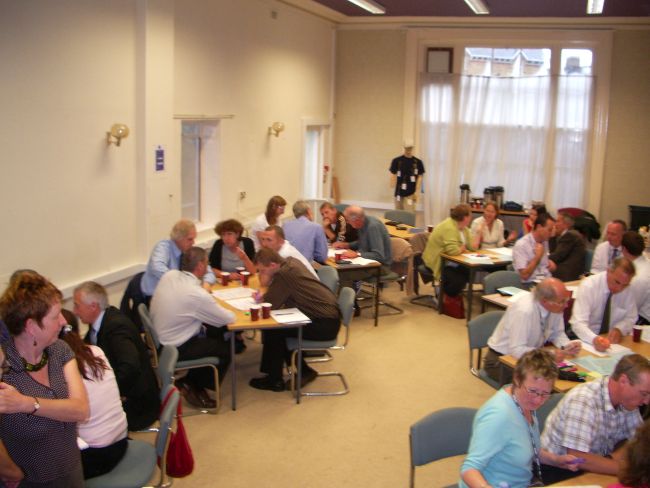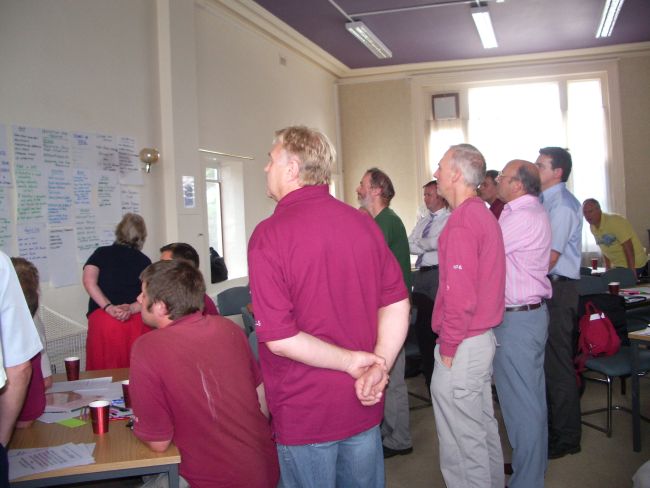1 Feb 2016
Burnout Tales: Chrissie Godfrey on the risks of the ‘Energy of Yes’

Chrissie Godfrey was formerly a co-ordinator of Transition Town Taunton (which she co-founded in 2008), but in 2012 suffered from a serious case of burnout. We asked her to tell her story, and we are deeply grateful for her honesty and for sharing her experience:
“When you first come together with other like minded people, when there’s a very pressing issue at hand and you’re learning more about it than you thought you’d ever learn, there’s a real energy around wanting to be a change-maker and wanting to make something happen. It’s a very exciting time when there’s a new group and there’s all sorts of possibilities out there. So even though the theme is burnout, this starts as actually quite a positive story.
The thing I want to say upfront is that any burnout was entirely of my own making. It wasn’t that Transition did this to me, it just so happened that at that time I was quite heavily involved in Transition, but there were other things going on in my life as well, including caring for a relative who was having a really tough time at the time as well.
I was thinking about what is it that creates the conditions for potential burnout to occur, and that maybe there’s something about personality types and particular skillsets that might end up being vulnerable to burnout, so this is a little thumbnail ‘why me’, because other people have avoided burn out.
People who are attracted to Transition are often those who can see opportunities. They can see Transition possibilities and they get very excited by those. They might be people who are accustomed to doing or to making things happen or to organising things. They might also be people who are quite good at networking, quite good at being unafraid of talking to people they don’t know or standing in front of a crowd of people and talking about stuff that they are passionate about.
There is a combination of people who can see opportunity and aren’t afraid to say “let’s have a go at this then”, plus being in other networks where people also have ideas. What it creates is a lot of things to say yes to. There’s a lot of us in Transition who love to say yes. You get an idea, it’s so exciting, you want to roll with it, and then there’s another idea and you can see how it links to idea number 1; then somebody puts their hand up and says “how about if we build in this bit” and it seems fantastic.
There’s a real sense of momentum that can build up quite early on in a group which is just brilliant. Relationships in the group are starting to flourish. In our group it felt sometimes like we were riding a crest of a wave. The Transition Network itself was quite new, and there was a huge amount of what I like to call the ‘energy of yes’.
What happened in our group with this sense of momentum was that a couple of us, again because of our particular work experience, got quite good at building ‘credibility’ with some local decision makers, movers and shakers. In our case that was definitely the local council. It was fun – it was fun being invited in to talk to the Chief Executive, and fun having one of the senior officers allocated to you to say – yes, let’s do some exciting work with every employee of Taunton Deane Borough Council.

We did loads of awareness raising workshops with everyone from the chief planning officer to the legal secretaries to the guy who drives the truck to pick up the dead leaves. It was absolutely brilliant. Because of that, we started to get quite a strong local profile. As a group, we would also turn up to stuff. We made sure we were quite visible.
Then, there’s something about wanting to be a magnet. You want to be a bit of a honeypot because you want loads of other people to come and join in and get involved. However, not all the things that you hope for actually happen. Whilst we had an amazing core group, which grew over time, ‘loads of people’ didn’t turn up to help. We had to learn to accept that there are so many different flavours of getting involved in Transition that may not mean actually joining your group.
I’ve started to think of it a bit like a family: you’ve got the family elders who are the ones who hold the centre. They hold the fort and are the decision makers, they’re the hosts for things. And then you’ve got the family members who want to be around you, who might like to turn up for a dinner party or Christmas and roll their sleeves up and do a bit of the washing up, but who disappear again back to their own lives.
Then you might have what I think of as the people down the street who just want to come once in a while for a cup of tea, just a casual drop by, no big commitment. Finally, you have your next door neighbours who don’t necessarily want to live in your house but they do want their house to be a bit like yours. These I think of as the other influencers in a town.
So we discovered that we had a core group of elders, who in our case held the centre, and then learned to work with the fact that the family members might want to turn up, but they won’t necessarily want the level of responsibility or time commitment that might come with being the elder…which was fine, except that by creating a lot of momentum, with a profile that’s visible, with more and more people are asking you to get involved in things, for me I reached a kind of tipping point. With my own internal push to sustain this momentum, I started to feel as though there was an entity that had got out of control.
As I say, there were other things going on in my life as well, but I look back on this time as a real tipping danger point. I wanted, in this interview, to flag up some of those dangers in case they resonate with anyone else.
One of these is that despite ourselves we can almost be drawn into the notion of a growth model, because we always want to do more. We want to be a bit bigger, we want to be a bit more visible, do another project. Because you’re part of a network and you’re always hearing stories about what people have done all over the world, which is obviously inspiring, there is a sense of it setting the bar quite high. Certainly for me on a personal level, I fell into a little bit of a trap of ‘unless I’m doing more it’s no good, it’t not enough’. Back to personality types – those people who say yes, often feel they ought to say yes more and yet again.
Then, there’s also something about the fact that even though it’s a voluntary group you can end up finding yourself in very professional contexts talking to other professionals and yet you’re sitting there without a job description (or pay!). So you have no boundaries over what you’re doing with this Transition gift time. You’ve got no external line manager saying “I think you’ve done enough now, that’s plenty now, you’re exceeding what you need to do”. Again, it’s a character thing, but that can really lead to self-exploitation if you’re not careful.
So there is a problem, if you’ve got people like me in the group who often say yes to things, you can end up with a group with unrealistic expectations of what it can handle. And being a voluntary group we didn’t do things that you would do if you were paid to work in an organisation such as proper project assessments, or clear role allocation, or sitting down and thinking about what the time commitments or skills would be needed. We’d just go “oh yeah, we’ll have a go at that”. And I do take a lot of responsibility for this.

It ended up that we said yes to things I really wish we hadn’t. The biggest one of these was the LEAF project (Local Energy Assessment Fund). This was a fund of money to help people in local communities get a better understanding of the energy needs of the households where they lived, and initiate projects around that. The problem was that applications were invited in just before Christmas, the decisions were to be made in January and then all of the grant money had to be spent by the end of March. And so all of the things I was saying about looking at a project and having the space and time to think through whether we can handle it, what the implications on our time might be, there was such a time pressure to go for this grant at all – and I did, and we got the money – that I nearly killed myself actually trying to deliver the project because I didn’t check out whether we had the people in the group willing to do the work.
Totally my own fault, but there was something about the system where there was this massive opportunity that I wanted to say yes to, but the time pressure was such that there wasn’t time for proper thinking back at grassroots level. I paid the price for that as it was absolutely knackering. Most of that project was delivered in the year where I finally collapsed and fell apart. It’s something for groups just to be mindful of, the tension between the speed at which the world works, particularly the world of grant aid in this instance, and the speed at which a voluntary group can realistically just have time to think and check out and test how much ‘energy of yes’ there is going on.
The other thing I have to ‘fess up to is that finding myself being a change maker is a bit of an ego ride – that happened for me, I’m not a saint. There’s something seductive about potential and wanting to say yes and wanting to be able to make change that matters to you. I came a cropper because of it, but I’m sure I’m not the only one out there in the Transition world who might resonate with that sense of – it is seductive to be able to do this, I want to make the change happen.
And I have a question: what do we mean by leadership in a Transition context? It’s almost like leadership’s a bit of a dirty word because we’re trying to be equitable and collaborative. Yet different leaders – if that’s even the right word – facilitators, motivators, whatever, will pop up from the mix in different places and leadership can sometimes just happen without it being thought through or talked about. What does that mean if I’m going to take a lead on this? What kind of leadership do we want for this particular piece of work?
Because we never talked about it, I think again because of my character and personality I probably took on aspects of leadership in the group which in the end became expectations of the group of me that I then found very hard to break. So it got into a little ‘Chrissie will’, because Chrissie always has, rather than stopping and going – hang on a minute, how did I get here?
There’s also another thing that contributed to my meltdown, which is that this kind of work can actually make you feel very vulnerable. Not everybody out there loves what you’re doing. I can remember when we were inviting people to train as home energy auditors and had quite a lot in the local press at the time about different things you can do to reduce your energy bills etc. I put my home phone number in the article because if people wanted to come to a particular public meeting I was going to be the point of contact.
I had a landlord ring up who screamed down the phone at me for about 10 minutes about how dare I be insisting on all this insulation because in his properties he tried to do that and all he had was damp running down the walls. He just went on and on and was literally screaming at me. The only thing I could do was in the end to scream back at him equally loudly so that he could hear there was another human being on the end of the phone trying not to burst into tears. I just had to talk me down and talk him down until he ended up apologising. And there was me, just an individual sitting in my sitting room at home. It really shook me.
Pack all of that up together with the fact that I was dealing with some quite difficult stuff in the rest of my life, I actually got very ill. I was helping deliver the Transition Conference 2012 which was an awful lot of work anyway, and was a brilliant conference. I’ll never forget that High Street we built as long as I live. But I came away from that conference absolutely and completely depleted to the extent that I was diagnosed as clinically depressed, which is quite a frightening place to be. It is hugely down to the fact that a personality like mine can end up taking on too much because of the energy of yes and the seductiveness of wanting to say yes. Actually seeing change happen that you’ve been part of making happen is so good, yet because we didn’t have overt conversations about leadership or managing our personal resources – in the way that we’re trying to manage the planet’s resources – the result for me was burnout.
Also we don’t have a clear way of how you step back from a position that you’ve had in a group. It’s almost like the models aren’t there yet for how you renegotiate your relationship. The only thing I could do was actually to put down everything. Stop absolutely everything. I was so unwell for about a year I found even working really hard.
The group is still going of course (mercifully no one is indispensable!) and I am proud to have been part of it”.